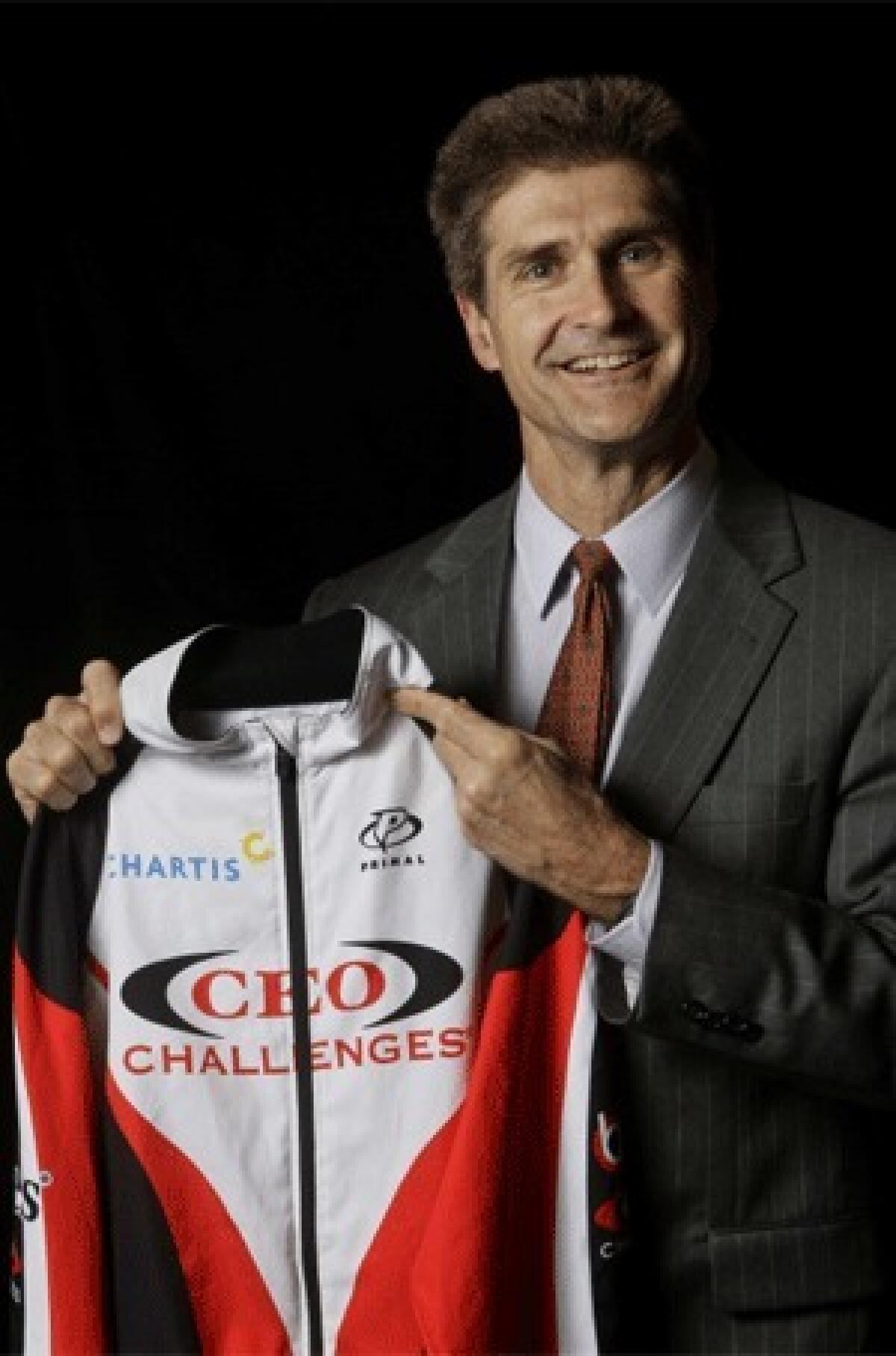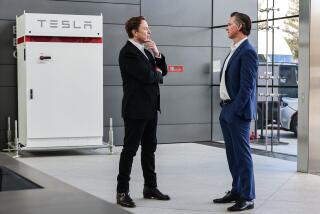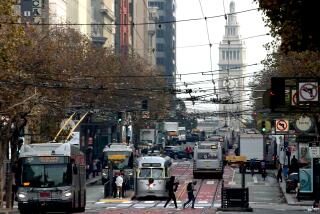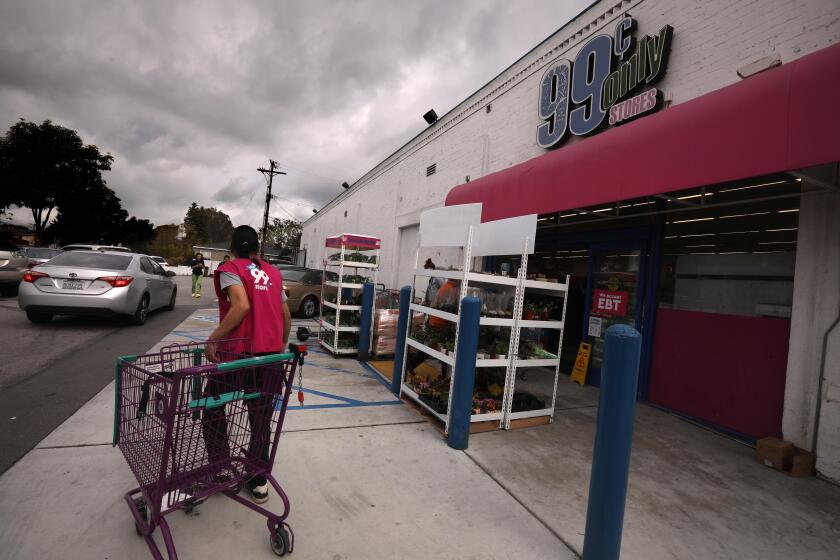Patt Morrison Asks: Carl Guardino, Silicon Valley’s big wheel

The last time I saw Carl Guardino, the head of the Silicon Valley Leadership Group, he was in a wheelchair after a biking accident encounter with some skateboarders. The wheelchair is probably the only form of transportation Guardino doesn’t like. He was appointed to the state transportation commission by a Republican governor and reappointed by a Democratic one. That pretty much sums up the way SVLG works: It’s about policy, not politics, and the issues are broad: from math education to affordable housing to opening a patent office in Santa Clara County. He commutes 32 miles a day by bike — good training for the marathon work of making life more livable for everyone, from waiters to millionaires, in what was once called “the Valley of Heart’s Delight.”
What is the Silicon Valley Leadership Group?
We represent 365 CEOs [from] high tech, bio-tech, green tech and financial services. The group was founded 35 years ago by David Packard. In a speech before a large contingent of CEOs, [he] said our responsibility is as much to our employees, our customers and communities as it is to our shareholders. They almost laughed him out of the room. But that became the essential element of what was called “the HP way.” That set the tone for Silicon Valley. My job is just not to mess up his legacy.
You worked at HP; did you meet Packard?
Yes, yes. He was a wonderful visionary and hard-driving, caring man. The press asked him: Why do you need a group; everyone returns your calls? Why are you engaged in government and policy? His quote was: “Our job, as CEOs, is not to sit on the sidelines, to cheer or boo. Our job is to get into the game and move the ball forward.”
Is that a hard sell in Silicon Valley?
We’re no longer infants when it comes to being engaged in public policy, but we are at best in early adulthood. The entrepreneurial mind-set doesn’t always initially understand the importance of government, in the positive sense but also the negative: If you’re not at the table, you’re often the menu. With some companies it’s still that way. There are a lot of free riders who are not engaged.
Now, [if] you’re a start-up struggling for that next dollar of investment, we understand you need your head down. We’ve just launched Startup Silicon Valley. For almost nothing they can [join]. We want instilled in their DNA to do what David Packard did. Most of these companies won’t survive, but the founders and CEOs will, and we want them invested.
You’re a transportation guy, and the leadership group backed two local ballot measures to raise sales taxes to bring BART into Silicon Valley. The groundbreaking is next month.
It shows how visionary [voters] are, and our CEOs, who not only supported a tax but led and funded that [campaign].
Some SVLG efforts — like lowering corporate taxes — are in line with most business groups, but creating a county housing trust and supporting transportation taxes?
Silicon Valley companies invest 15%, 20%, 25% of their profits in research and development. That spills over into investing in the future of your workforce. We don’t look at government revenue as taxes as much as we do investment, as long as it’s transparent, accountable and broad-based.
The SVLG defies ideological description. We’re pragmatists and problem-solvers. It makes our positions on policies probably frustrating to some who are partisan but liberating for those who just want to make a difference. We don’t have a PAC. We don’t endorse candidates. We don’t make political contributions. We do get deeply involved in policies that impact our employees and our ability to innovate. One day we are leading initiatives that make our Republican friends scratch their heads. Another day we are working for [policies] that make our Democratic friends scratch their heads.
We hear about newly minted Silicon Valley millionaires, but what about everyone else there? You were a construction worker for a while; you know what it takes to make that kind of living.
Our CEOs get that we can’t just act on policies that are good for our own workers and their families. It’s enlightened but not enlightened enough.
Silicon Valley has a reputation for being notoriously tight about charity. Why is that?
There’s certainly a lot of room for growth. Facebook will soon be an example of hardworking folks who are going to find themselves with very thick wallets. It matters what we do in life with our wealth. We’re hoping to steer people toward remembering that with great riches also comes thoughtful responsibility.
What does the SVLG think of the state of the California economy?
Before Gov. Brown was sworn in, his team asked us to put together a white paper. They wanted us to answer this question: What would it take from Sacramento for innovation-economy employers to start creating technological and manufacturing jobs? It was absolutely the right question. Six weeks later we gave them 32 game-changers. Six of the 32 were enacted in total or in part. We have our eyes on three or four key ones, including governance reform.
Did the SVLG weigh in on the recent Internet anti-piracy legislation battle on Capitol Hill?
The leadership group is a regional association, and we know our place. We certainly opposed SOPA and PIPA, [but] I won’t overstate our work. It is not fair that innovative content makers in television movies and music are ripped off by pirates around the world. It’s equally unfair that innovation-economy entrepreneurs and companies are held accountable for the actions of others, namely offshore, [on] which they can have almost no impact. We hope everyone will calm down and find a solution.
You ran for office once, for the Santa Clara County Board of Supervisors, and lost, against Mike Honda, now a Democratic congressman.
Talk about learning by making mistakes. Mike Honda and I met on the campaign trail. We became friends, and he walloped me and deservedly so. The main lesson I learned was that you can effect change without being in elected office, and I prefer it this way. I still get my weekends off.
Your family includes an adopted daughter, Siena, now almost 3. Her birth circumstances gave you a new mission.
We adopted Siena at 1 day old out of a small town in Utah. She’s 100% Latina. The 17-year-old birth mom, no high school diploma, not married, no job — smart, sweet, caring — already had a 2-year-old. As we [later] looked into the Latina population in Silicon Valley, what we found troubled us. The high school graduation rate is incredibly low, let alone college. And that led us through the SVLG to launch leadership summits in disadvantaged middle schools. We bring in high-powered women leaders so the young ladies can see and hear people who look like them who have different outcomes than perhaps they expect from their own lives. It ties into [the SVLG’s] tutoring initiative to help students in disadvantaged schools with reading, science and math.
You trained for the ministry; why did you switch to public policy?
For me, more important than making money is making change. I was in Bible college; I had done an internship for a state Assembly member. I was at a crossroads. I called my pastor and said I want to serve but I’m not sure whether it’s from the pulpit or from public policy. He walked me through that, [and] I went into public policy. We’re very active in our church, which is focused greatly on helping other people.
What didn’t I ask you about?
You didn’t ask me about my wife, Leslee! After seven years of constant badgering asking her out, she finally said yes with a three-line email: How about sushi? She’s the entrepreneur of the family. She was one of three women executives at a Fortune 500 company. After we had [our older daughter] Jessica, she called me from the airport on another trip to China. The TSA officer had broken her breast pump. She couldn’t do [it] anymore. She started her own business. It does environmental compliance, social and corporate responsibility.
It just occurred to me — if all your transit plans succeed, then there may be no need for those famous Silicon Valley garages where people invent genius ideas!
That’s classic. I’m going to steal that.
This interview was edited and excerpted from a longer taped transcript.
Archive: latimes.com/pattasks.
More to Read
A cure for the common opinion
Get thought-provoking perspectives with our weekly newsletter.
You may occasionally receive promotional content from the Los Angeles Times.







